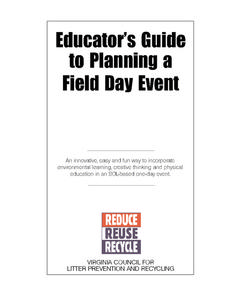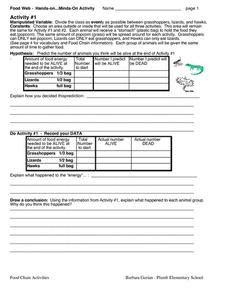San Francisco Public Utilities Commission
Let's Save Water: Water Conservation
Did you know that cutting down your shower by one minute a day can save five gallons of water? Learn about water conservation with a science reading activity. After kids finish reading key terms and water-saving tips in a reading...
Illinois Department of Natural Resources
Section Two: Why is Biodiversity Important?
Explore soil, genetic traits, natural resources, and pollution in a series of lessons that focus on biodiversity. Kids complete experiments to learn more about the importance of varied genes and organisms in an ecosystem.
Illinois Department of Natural Resources
Section One: What is Biodiversity?
Four intriguing and scientific activities invite learners to explore the natural resources of their town. The activities cover concepts such as genetic traits, organizing species in a taxonomy, the differences between different species...
Curated OER
Penny Science
A penny can be a much more valuable teaching tool that you might think. Whether you are teaching about chemical reactions, surface tension, the behavior of gases, or are just looking for engaging activities for early finishers, this...
National Science Teachers Association
Hop into Action
Young scientists find out what makes amphibians such unique and interesting animals in this simple life science lesson. After looking at pictures and discussing the characteristics of amphibians, learners complete a series of three Venn...
K12 Reader
World Climates
Why is weather different around the world? Learn about world climates with a reading comprehension passage. Kids read a short passage before answering five comprehension questions based on context clues.
Virginia Department of Education
Educator’s Guide to Planning a Field Day Event
Plan an environmentally friendly field day for your young conservationists with this collection of activities and resources. Whether it's bowling with plastic bags full of crumpled up newspaper and empty plastic bottles, or having relay...
AtoZ Teacher Stuff
Pumpkin Life Cycle
From seed to jack-o-lantern, young scholars walk step-by-step through the life cycle of pumpkins with this fun art and science activity. After first participating in a shared reading of the children's book Pumpkin, Pumpkin children color...
Brooklyn Children’s Museum
Volcanoes!
Give young geologists an up close and personal look at volcanoes with a series of hands-on earth science lessons. Whether they are investigating the properties of igneous rocks, building their own volcanoes, or making fudge to model the...
Agriculture in the Classroom
Six Kinds Do It All
Teach young engineers that all machines, no matter how complicated or complex, are made up of just six simple devices with this hands-on physical science lesson. Using the included templates, students first create paper models of...
Science Geek
Build a Food Web Activity
Entangle your life science class in learning with this collaborative food web activity. Using pictures of the plants and animals native to a particular ecosystem, young biologists work in small groups to construct visual representations...
K12 Reader
What’s the Forecast?
A reading comprehension passage is illustrative for both language arts and earth science skills. Using context clues, learners find out how to predict the weather using various tools. They then answer five reading questions about what...
NOAA
Sustaining Our Ocean Resources
Lead young scientists on an investigation of fishery practices with the final installment of this four-part unit. Using a PowerPoint presentation and hands-on simulation, this activity engages children in learning how fish populations...
NOAA
Seafood and Human Health
Whether your young biologists realize it or not, humans play a significant role in marine ecosystems. To help them understand this fact children first create graphical representations that show homo sapiens' place in marine food chains,...
NOAA
An Ocean of Energy
Young biologists trace the path of the sun's energy through marine ecosystems in the second part of this four-lesson series. Building on prior knowledge about producers, consumers, and decomposers students are introduced to the concept...
NOAA
Understanding Food Chains and Food Webs
Jump into an exploration of marine ecosystems with the first lesson in this four-part series. After first learning about crustaceans, mollusks, and other forms of sea life, young marine biologists view a PowerPoint presentation that...
Cherokee County Schools
Simple Machines Project
The choice is simple: create a PowerPoint presentation, write a book, or invent a compound machine. Whichever project your young scientists choose, they will be engaged in creatively demonstrating their knowledge of simple machines and...
Umaine Museum of Art
Bony Fish Anatomy Worksheet
Take time to appreciate the beauty in the anatomy of animals with this cross-curricular art and science activity. After viewing examples of fish-themed artwork, children complete the included worksheet by labeling the different parts of...
Curated OER
Food Chain Activities
Transform young biologists into grasshoppers, lizards, and hawks as you teach them about food chains in an interactive life science simulation. Working collaboratively to act out three different scenarios involving these creatures,...
Ask a Biologist
It’s a Plankton Eat Plankton World
For as small as they are, plankton sure play an enormous role in maintaining marine ecosystems. Dive into an investigation of these tiny organisms with a hands-on life science activity in which children cut out pictures of sea animals...
Exploring Nature Educational Resources
Building A Classroom Food Web
From bears and owls to chipmunks and trees, all life depends on the sun for the energy to survive. Young biologists develop an understanding of this big idea as they arrange this series of plant and animal picture cards into food webs...
Reading Is Fundamental
Summer Fun...
Extend learning through summer with these activity ideas! Individuals can choose one or all nine of the activities, which range from a summer reading goal to an examination of local insects (with accompanying story prompt). See the...
Science Companion
Simple Machines Design Project
Make your work as a teacher a little easier with a physical science project on simple machines. After introducing young scientists to these devices and identifying their different uses around the school, this project engages children in...
K12 Reader
A Planet in the Solar System
Take young scientists on an exploration of the cosmos with this cross-curricular writing exercise. Tasked with producing an expository composition describing a planet of their choosing, students perform research and present their...

























